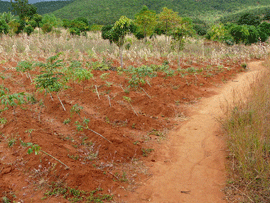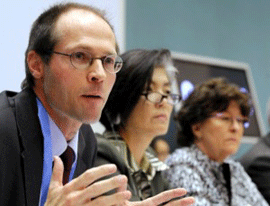Preventing Food Colonies
Air Date: Week of July 17, 2009

Agriculture in southern Tanzania. Saudi Arabia has bought 500,000 hectares of land in Tanzania. (Photo: Egbert)
Some of the richest countries are buying up large swatches of land in some of the poorest countries. The wealthy foreigners produce crops abroad for pennies on the dollar and then ship the goods home. Olivier De Schutter is the United Nations Special Rapporteur on the Right to Food. He discusses the ethical quandaries of this new colonialism with host Jeff Young.
Transcript
YOUNG: Whether the crops go for fuel or food, the world’s rich countries are now looking to the developing world to do more of their farming. A number of wealthy nations are buying or leasing chunks of poorer countries and shipping the crops home-- essentially outsourcing agriculture.
Critics call it a “land grab” and “neo colonialism.” Olivier De Schutter hopes for a more positive outcome. He’s the United Nations Special Rapporteur on the Right to Food. And Mr. De Schutter says the scale of these land deals means the stakes are high.

Olivier de Schutter.
YOUNG: Now the way you’re describing it there is sounds like this should be a mutually beneficial deal, but that’s not really the way it’s playing out, is it?
DE SCHUTTER: Well there are essentially three problems. One is access to land for the local population, which often has no remedies available when they are evicted from the land they cultivate. A second problem is food security for the local population because all the surplus food which will be produced will be shipped abroad and will not feed the local population. And a third problem is the transference and the use of the revenues which the host government shall gain from leasing or selling the land to foreign investors. There is no transparency, there is no accountability in the way these revenues shall be used for the benefits of the population.
YOUNG: You know, this sounds a lot like just a new twist on colonialism. Is that what we’re seeing here?
DE SCHUTTER: Well I suppose the critics of these deals do describe these as a form of neo-colonialism. What we did with, you know, the battleships in the past we now are doing with the power of the purse. But of course there are other outcomes possible, and it’s quite clear that if these investments are well managed and if they lead to infrastructures being built and to technologies arriving and to employment being created, then they could be beneficial and then the description of neo-colonialism may not be entirely justified.
YOUNG: So how do we get to that kind of outcome? What are your recommendations?
DE SCHUTTER: Well I put forward some eleven principles which are based on human rights. Basically these principles should ensure that the investors imposed more far- reaching obligations than is currently the case. You know these deals, they concern thousands and sometimes millions of hectares, and they are short documents of three, four pages without any description in these documents of any obligation of investors. For example, to create employment, to respect the environment, to respect the food security of the local population or not to evict peasants. And I think it’s absolutely vital that these obligations be better clarified in the conclusion of these deeds. And so the principles aim to guides states in basically achieving better outcomes.

Agriculture in southern Tanzania. Saudi Arabia has bought 500,000 hectares of land in Tanzania. (Photo: Egbert)
DE SCHUTTER: We have recently passed the bar of one billion people who are hungry, not because we are not producing enough food. These people are hungry because they are poor. The big fear I have and which many people have is that these foreign investments shall increase the gap between the happy few large-scale producers who will benefit and the vast majority of small-scale producers who will be further marginalized because out of one billion people who are hungry today, some fifty percent are small farmers living in developing countries. And these are the ones who need to benefit, these are the ones who need to be helped.
YOUNG: Olivier De Schutter is the United Nations Special Rapporteur on the Right to Food. Thank you very much for your time.
DE SCHUTTER: You are very welcome. Thank you.
[MUSIC: Ce’U “Rosa Meninha Rosa” from Vagarosa (Six Degrees Records 2009)]
YOUNG: Coming up – the rise of the Greens on the borders of the Black Sea. Keep listening to Living on Earth.
Links
Read the UN statement of principles large-scale land purchases.
Living on Earth wants to hear from you!
Living on Earth
62 Calef Highway, Suite 212
Lee, NH 03861
Telephone: 617-287-4121
E-mail: comments@loe.org
Newsletter [Click here]
Donate to Living on Earth!
Living on Earth is an independent media program and relies entirely on contributions from listeners and institutions supporting public service. Please donate now to preserve an independent environmental voice.
NewsletterLiving on Earth offers a weekly delivery of the show's rundown to your mailbox. Sign up for our newsletter today!
 Sailors For The Sea: Be the change you want to sea.
Sailors For The Sea: Be the change you want to sea.
 The Grantham Foundation for the Protection of the Environment: Committed to protecting and improving the health of the global environment.
The Grantham Foundation for the Protection of the Environment: Committed to protecting and improving the health of the global environment.
 Contribute to Living on Earth and receive, as our gift to you, an archival print of one of Mark Seth Lender's extraordinary wildlife photographs. Follow the link to see Mark's current collection of photographs.
Contribute to Living on Earth and receive, as our gift to you, an archival print of one of Mark Seth Lender's extraordinary wildlife photographs. Follow the link to see Mark's current collection of photographs.
 Buy a signed copy of Mark Seth Lender's book Smeagull the Seagull & support Living on Earth
Buy a signed copy of Mark Seth Lender's book Smeagull the Seagull & support Living on Earth

